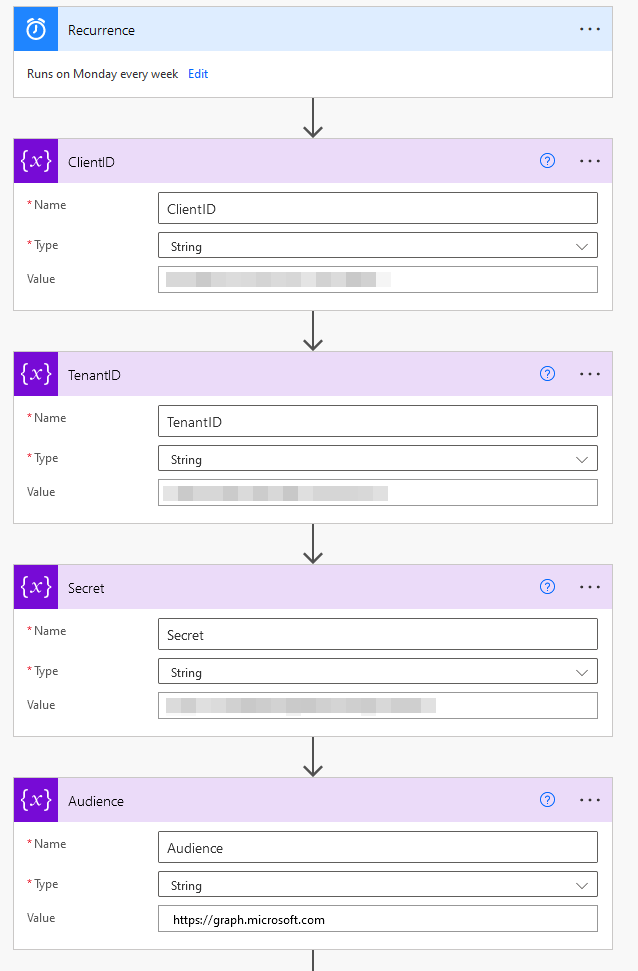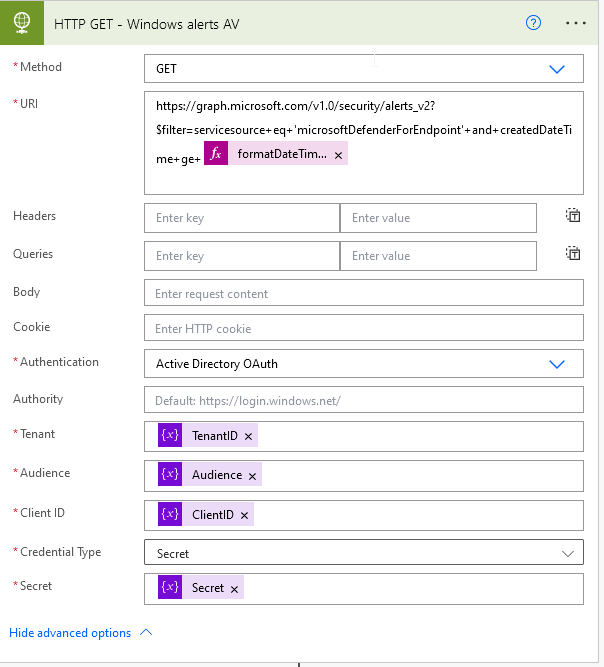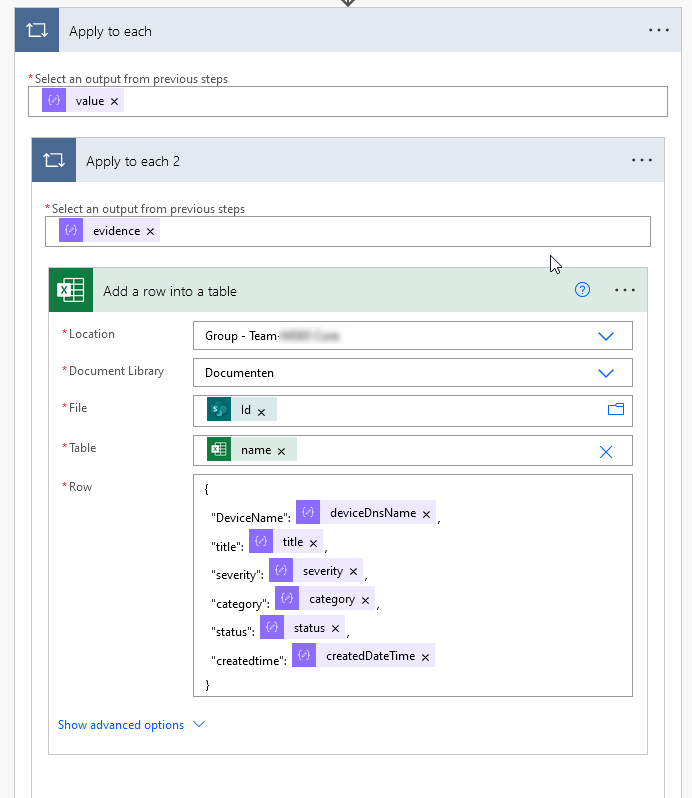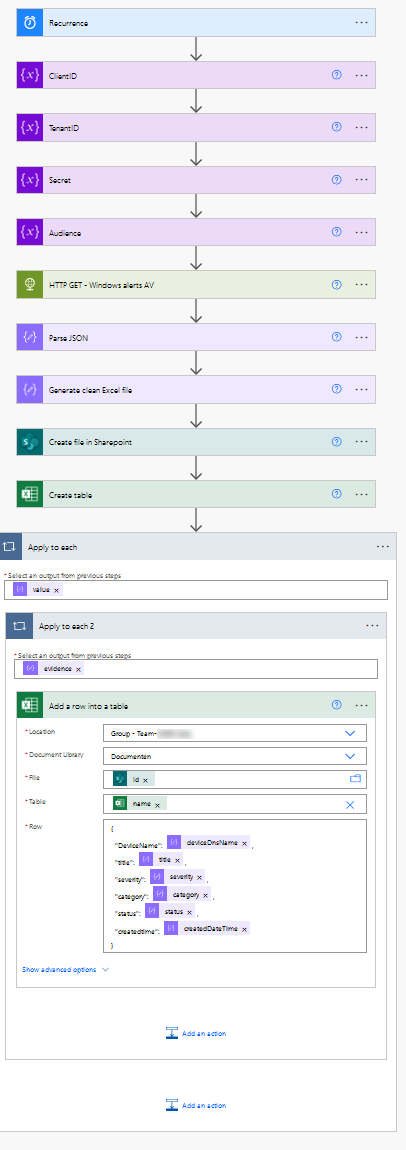Microsoft Defender for Endpoints reports to Excel
In this tutorial, I’ll walk you through the process of setting up automated reporting from Microsoft Defender for Endpoint alerts directly to an Excel sheet using Power Automate and/or Logic App. By implementing this solution, you’ll gain valuable insights into activities within your environment, simplifying monitoring and analysis tasks. Let’s dive into the steps to streamline your reporting workflow and empower your security efforts.
Prerequisites:
Power Automate Premium (for HTTP connector)
App registration in Azure with the following permission:
Graph API > SecurityAlert.Read.All (Application)
Make a App Registration in Azure
- Go to portal.azure.com
- Click on Azure Active Directory
- Click on App Registration
- Click on New Registration
- Create a new name and click on Register
- After the app has been created go to API Permissions
- Click on Add a Permission
- Select Microsoft Graph and select Application Permissions
- Look up the following permission SecurityAlert.Read.All and add this to the application followed up by granting admin consent
Create a client secret
- Go to your newly created app
- Go to Certificates & Secrets in the left menu
- Click on New Client Secret
- Set a description and expiry to your liking
- Copy the value of the secret, you won’t be able to see this after you close this window
Make the flow:
- I’ve made a recurrent flow so it runs every Monday at 10 AM.
-
We need to initialize 4 variables so it can use the app registration in Azure
Name Variable Name Type Value Initialize TenantID TenantID String {Paste your Tenant ID} Initialize ClientID ClientID String {Paste your Client ID} Initialize Audience Audience String https://graph.microsoft.com Initialize Secret Secret String {Paste your Secret} Your flow should look something like this:

- Make a new step with a HTTP connector with the following settings:
Method: Get
URI:https://graph.microsoft.com/v1.0/security/alerts_v2?$filter=servicesource+eq+'microsoftDefenderForEndpoint'+and+createdDateTime+ge+@{formatDateTime(subtractFromTime(utcNow(), 7, 'Day'), 'yyyy-MM-ddTHH:mm:ssZ')}this URI will get all alerts from Microsoft Defender for Endpoint in the last 7 days
Authentication: Active Directory OAuth
Put in the variables from step 2 inside Tenant, Audience, Client ID and Secret
The step should look like this:

- Make a new step with a Parse JSON variable
Content should be:
Body Schema{ "type": "object", "properties": { "statusCode": { "type": "integer" }, "headers": { "type": "object", "properties": { "Transfer-Encoding": { "type": "string" }, "Vary": { "type": "string" }, "Strict-Transport-Security": { "type": "string" }, "request-id": { "type": "string" }, "client-request-id": { "type": "string" }, "x-ms-ags-diagnostic": { "type": "string" }, "OData-Version": { "type": "string" }, "Date": { "type": "string" }, "Content-Type": { "type": "string" }, "Content-Length": { "type": "string" } } }, "body": { "type": "object", "properties": { "@@odata.context": { "type": "string" }, "value": { "type": "array", "items": { "type": "object", "properties": { "id": { "type": "string" }, "providerAlertId": { "type": "string" }, "incidentId": { "type": "string" }, "status": { "type": "string" }, "severity": { "type": "string" }, "classification": {}, "determination": {}, "serviceSource": { "type": "string" }, "detectionSource": { "type": "string" }, "productName": { "type": "string" }, "detectorId": { "type": "string" }, "tenantId": { "type": "string" }, "title": { "type": "string" }, "description": { "type": "string" }, "recommendedActions": { "type": "string" }, "category": { "type": "string" }, "assignedTo": { "type": "string" }, "alertWebUrl": { "type": "string" }, "incidentWebUrl": { "type": "string" }, "actorDisplayName": {}, "threatDisplayName": { "type": "string" }, "threatFamilyName": { "type": "string" }, "mitreTechniques": { "type": "array" }, "createdDateTime": { "type": "string" }, "lastUpdateDateTime": { "type": "string" }, "resolvedDateTime": { "type": "string" }, "firstActivityDateTime": { "type": "string" }, "lastActivityDateTime": { "type": "string" }, "systemTags": { "type": "array" }, "alertPolicyId": {}, "additionalData": {}, "comments": { "type": "array" }, "evidence": { "type": "array", "items": { "type": "object", "properties": { "@@odata.type": { "type": "string" }, "createdDateTime": { "type": "string" }, "verdict": { "type": "string" }, "remediationStatus": { "type": "string" }, "remediationStatusDetails": {}, "roles": { "type": "array" }, "detailedRoles": { "type": "array", "items": { "type": "string" } }, "tags": { "type": "array" }, "firstSeenDateTime": { "type": "string" }, "mdeDeviceId": { "type": "string" }, "azureAdDeviceId": { "type": "string" }, "deviceDnsName": { "type": "string" }, "osPlatform": { "type": "string" }, "osBuild": { "type": "integer" }, "version": { "type": "string" }, "healthStatus": { "type": "string" }, "riskScore": { "type": "string" }, "rbacGroupId": { "type": "integer" }, "rbacGroupName": {}, "onboardingStatus": { "type": "string" }, "defenderAvStatus": { "type": "string" }, "ipInterfaces": { "type": "array", "items": { "type": "string" } }, "vmMetadata": {}, "loggedOnUsers": { "type": "array" }, "detectionStatus": { "type": "string" }, "fileDetails": { "type": "object", "properties": { "sha1": { "type": "string" }, "sha256": { "type": "string" }, "fileName": { "type": "string" }, "filePath": { "type": "string" }, "fileSize": { "type": "integer" }, "filePublisher": {}, "signer": {}, "issuer": {} } } }, "required": [ "@@odata.type", "createdDateTime", "verdict", "remediationStatus", "remediationStatusDetails", "roles", "detailedRoles", "tags", "mdeDeviceId" ] } } }, "required": [ "id", "providerAlertId", "incidentId", "status", "severity", "classification", "determination", "serviceSource", "detectionSource", "productName", "detectorId", "tenantId", "title", "description", "recommendedActions", "category", "assignedTo", "alertWebUrl", "incidentWebUrl", "actorDisplayName", "threatDisplayName", "threatFamilyName", "mitreTechniques", "createdDateTime", "lastUpdateDateTime", "resolvedDateTime", "firstActivityDateTime", "lastActivityDateTime", "systemTags", "alertPolicyId", "additionalData", "comments", "evidence" ] } } } } } } -
Create a new step with Create File in Sharepoint
Choose a site address
Choose the folder where you want to create the file
File name should be:
Report - Anti Virus Alerts @{formatDateTime(utcNow(), 'dd-MM-yyyy')}.xlsxFile Content: use a expression with: Null
-
Create a new step to create table Location should be the same location as step 6
Document Library: Documents
File:
@outputs('Create_file_in_Sharepoint')?['body/Id']Table Range: A1:F1
Column names:
DeviceName,title,severity,category,status,createdtime -
Create a Apply to Each step Ouput should be:
@{body('Parse_JSON')?['value']}
Create another Apply to Each step inside this, this ouput should be:@{items('Apply_to_each')['evidence']} - Create a Add a row into a table step inside Apply to Each 2 Location: Same as in step 6
Document Library: Documents
File: @outputs('Create_file_in_Sharepoint')?['body/Id']
Table: @outputs('Create_table')?['body/name']
Row:
{
"DeviceName": @{items('Apply_to_each_2')?['deviceDnsName']},
"title": @{items('Apply_to_each')?['title']},
"severity": @{items('Apply_to_each')?['severity']},
"category": @{items('Apply_to_each')?['category']},
"status": @{items('Apply_to_each')?['status']},
"createdtime": @{items('Apply_to_each')?['createdDateTime']}
}
It should look like this:

End result screenshot
Info Notice: There is a “clean excel file” step. However this isn’t needed if expression is set at Null in step 5.

